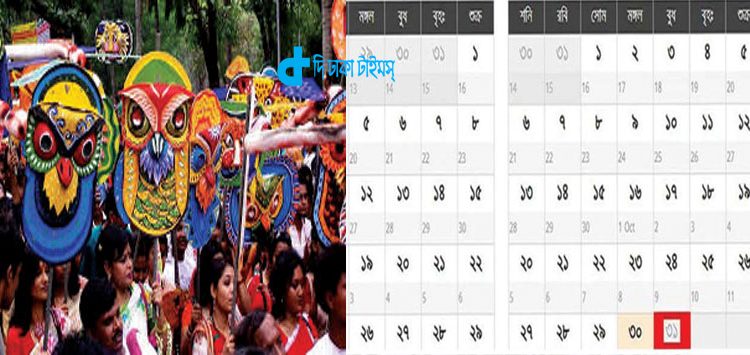The Dhaka Times Desk The Bengali calendar has been modified in Bangladesh to align the historical dates associated with the state with the Gregorian calendar.

According to a news report by BBC, this change has been made only for Bangladesh. This change was not made even in West Bengal of India where Bengali is one of the state languages.
This change has been made as from now on the important national days including 1st Boishakh will be celebrated on specific days.
That change was brought about
It has been decided that according to the new calendar in Bangladesh, from now on the first 6 months of the Bengali year will be counted as 31 days. Previously, the first 5 months of the year were counted as Baishakh, Jaishtha, Ashad, Shravan, Bhadra. From now on, the remaining 5 months except Falgun month will be observed in 30 days. The month of Falgun will be 29 days, only in leap years the month of Falgun will be a month of 30 days.
According to the media report, the research, compilation and dictionary and encyclopedia department of Bangla Academy has done this work of changing the Bengali calendar.
Director of this department Mohammad Mubarak Hossain said that important national days like 21st February, 16th December, 26th March will be observed on the same day as they were held according to Bengali calendar.
As it happened on 21st February 1952. Which is now celebrated as International Mother Language Day and World Mother Language Day. In 1952, the incident of shooting at a march for the demand of language took place in Bangla 8th Falgun.
However, most of the time around the year, now 21st February falls on 9th Falgun, which has been objected by many writers, poets and literary people.
Mohammad Mubarak Hossain was telling the media, similarly, the Victory Day of Bangladesh on December 16, 1971 was the 1st Paush, but the day was read as the 2nd Paush in the Bengali calendar.
"Again, the days of Rabindra Jayanti and Nazrul Jayanti and their death days also do not coincide with the day of the Bengali calendar, the day of the Gregorian calendar never matches. So the new rules have adjusted the counting of days between the two calendars.”
When did this date change?
Mohammad Mubarak Hossain, Director of Research, Compilation and Dictionary and Encyclopaedia Department of Bangla Academy, said that this change has been started since the first day of the current 1426 Bangla year.
But since the first 5 months were of 31 days according to the earlier rules, this change was not understood till the month of Ashwin.
According to the new calendar, the 31-day Ashwin month was observed for the first time on Wednesday.
As the 1st Kartika count begins on Thursday 17th October, the changes to the new calendar are first seen. Although almost all the calendars of Bangladesh have written the date according to the old rules.
According to an information, the calendar has been reformed for the second time in Bangladesh. A committee was formed under the leadership of Shamsuzzaman Khan, then Director General of Bangla Academy in 2015 to bring new changes. Dr. in that committee. Ajay Roy, Jamilur Reza Chowdhury and several expert members were also present.
Shamsuzzaman Khan, a member of that committee, said that the work of reforming the Bengali calendar first started in India in 1952.
A Calendar Reform Committee was formed by the Government of India headed by renowned astronomer Meghnad Saha, a native of Bangladesh.
"Prior to that, the Bengali calendar was based only on the lunar calendar, which had no scientific basis. The committee of Meghnad Sahar recommended the reformation of the Bengali calendar in the light of astronomy and it was accepted. Then in 1956 Dr. Some recommendations for reforming the Muhammad Shahidullah calendar are made to the government. The new calendar was made in his light.”
It is known about the beginning of the Bengali calendar, according to historians, the Bengali year was introduced from the year 1556.
The then Mughal Emperor Jalaluddin Muhammad Akbar introduced a new system of counting the year called 'Tarikh-e-Elahi' in 1584 AD with the help of his court astronomer Amir Fatullah Shirazi for the convenience of tax collection.
This Bengali season was known to farmers as 'Fasli season', which was later popularized as 'Bangla season' or 'Bangabd'.
The prevailing royal year at that time was 'Hijri year', which was not possible to collect rent in the same month every year after the lunar year.
It is known that the Bengali year did not start from zero, the year when the Bengali year was introduced, the Hijri year was actually 923 Hijri.
According to the order of the emperor, the year of the introduction of the Bengal Sun began with the age of 923. And the months of this Bengal year are named after different stars.
Bengali Son has been introduced in different countries in different ways. Shamsuzzaman Khan, the former Director General of Bangla Academy, said that the Gregorian calendar has been changed many times and reformed over the years.
The Pope's reform of the Gregorian calendar in Italy led to Catholic-Protestant strife, and England adopted it 75 years later.
It should be noted, however, that not only the Bengali calendar, but also the Hijri calendar has been reformed several times.


